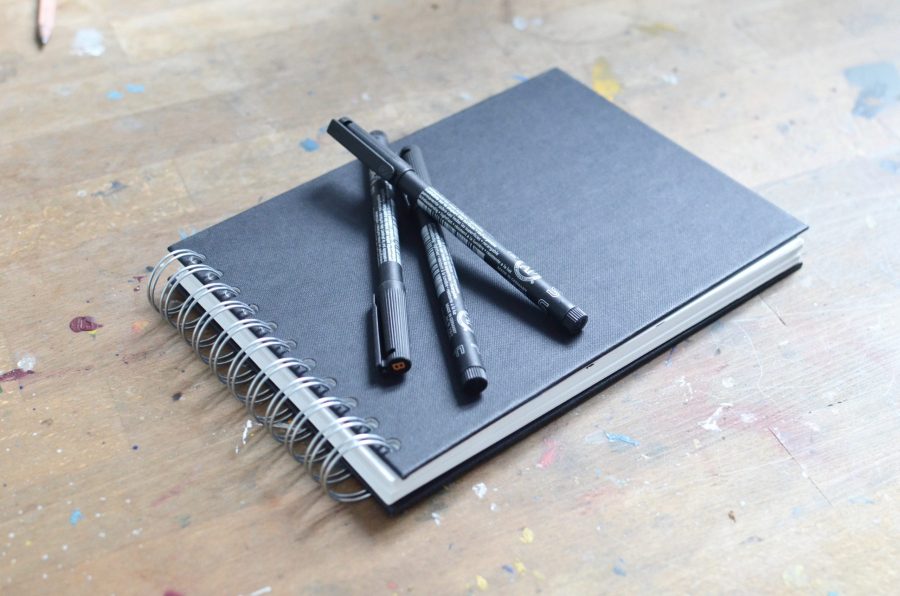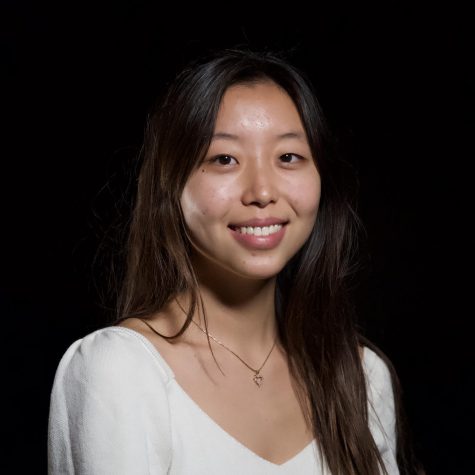Student-run organization, “Revellations,” finds their members discovering their own epiphanies in writing and making these revelations known through their online posts and publication as a whole.
The colleges that are spread out on UC San Diego grounds carry some official writing-oriented organizations for aspiring writers or simply the curious student scouting for clubs to join.
“Revellations” — which has no affiliation with a religious organization — is one such official writing publication in Revelle College. They declare that they are the oldest student writing publication on campus. In fact, they started out as a newspaper a few years after UCSD was first established in 1960 before fading out over the years. They began to get more heavily involved around 2017 through publishing visual and written pieces online.
The reason behind the choice of the name “Revellations” is a mystery. The name might stem from the revelations that occur during the writing process. Overall, it’s a charming pun.
Reese Welch, a senior, reflects on her experience thus far as chair of “Revellations.” She is open to on-the-spot conversations and is warmly conversational, never breaking eye contact or flow. She takes on ice breakers without hesitation and when she talks, she uses grand hand gestures while delving into the publication that she dubs as one of the hidden gems on campus.
While Revelle College funds the publication, students from any college are welcome to join. Welch joined the publication in 2018 as a freshman after seeing them advertise through tabling on campus. It was advertised as a creative writing publication, which drew her in immediately. As a creative writing minor, she said that writing occupied all of her free time and she relished that this platform functioned as a safe space for her.
Though Welch likes short stories, many members also focus on rhyming in poetry or free-form material. Others do photography. Some try to describe normal experiences and sounds as well as engage in horror and interactive themes. For instance, one section of the publication in early 2019 called “The Fog” was interactive, with individuals being able to choose which route to take around campus amidst a foggy environment by choosing from a set of links. It’s akin to the Twine platform, where you create a full story that others follow along by clicking a pathway. These kinds of pieces are also unique for each reader, which makes for an active and personalized experience.
“It fosters a community of writers … gives us the space to brainstorm … to go and be creative,” Welch told The UCSD Guardian.
The organization puts emphasis on writing out of a desire to write above anything else. Welch explicitly says that they’re not trying to sell anything.
They do have printed pamphlets, which may return at the end of this quarter or the next, along with a tabling event called “The Best of Revellations,” which is composed of poems or story snippets from each writer.
The members used to pass out the pamphlets once a quarter in Revelle Plaza along with donuts. Physical publications would always be reserved for the end of the quarter as a celebration of the members’ hard work.
But nothing has been strict about the format: the types of writings or the number of pieces have never been capped or fixed, and writers are encouraged to write as much as they want.
There is a neat balance between discerning the need to write and going on your own schedule of creative output. Here, the team embraces the latter. Welch believes that there aren’t many organizations like “Revellations,” with a fixation on creative writing sans the strict deadlines.
In fact, she compares it to a creative writing class on campus without the daunting grade aspect. Works from creative workshop classes are sometimes even submission pieces for “Revellations.”
“[‘Revellations’] fosters a community for creative writing. It gives us a space to give each other feedback, brainstorm, things like that,” Welch said. “It’s incredibly validating and it’s also just really fun. We’re such a small org — we’re very much like a group of friends.”
As chair of the publication since her second year, Welch is familiar with the logistics of the team. She directs the meetings and helps post on their Facebook page and Medium platform; in the latter, they post their works on Mondays, Wednesdays, and Fridays.
However, there are some challenges. Welch calls the Medium site hostile sometimes; the difficulty in indenting makes for a hard time displaying the works, particularly experimental poetry that has intentional spacing and overall formatting. They humorously bypass the issue sometimes by screenshotting their work and posting that instead.
Along with this challenge, “Revellations” had an online year with its own ups and downs due to COVID-19. Consistency was especially hard to maintain, and Welch acknowledges this.
“COVID was a really difficult time for everyone,” Welch said. “I myself have slipped with the online format, which I do regret. [But] I can’t be too hard on myself. I can’t be too hard on others.”
This quarter, they are publishing solely on the Medium site. The effects from COVID still linger — weekly meetings will probably stay in Zoom format until fall quarter.
Otherwise, Welch said that she has been very happy with her team at “Revellations.” Welch is in charge of being an intermediary voice between her and her supervisor, and is a leader in her own right.
During meetings, the environment is just as liberal as the writing is. Welch starts the meeting by discussing current events and catching up with everyone’s days. Sometimes, they end up just chatting loosely about whatever comes to mind or having fun, engaging group activities. She reminisces on the past when they used to do quickwrite “flash writing,” in which they quickly dive into a prompt and write about it.
Then, they jump into the pieces that are ready, which go into the Google Drive. Each piece in the drive gets verbal feedback. Members take turns giving general feedback in a workshop format and engaging in marginalia for the work–but never directly editing, which is considered impolite.
Marginalia consists of readers writing notes in the margins of books or documents; while it allows for you to be actively engaged with the material in literature, it also allows you to also make “tangible” commentary that allows for discussion with others to arise.
When the works are ready to be published, the writers can publish onto the Medium site. But this is not mandatory; many works can stay in the Google Drive for personal viewing and sharing with other members.
The goal ultimately is to foster creative writers. The world is your oyster; you can explore mediums such as poetry, short stories, and nonfiction essays and stick to what they know or branch out. The space is serene and intimate — any creative writing is welcome and worthy there.
Katie Clemmer writes for “Revellations” and is taking a workshop writing class on campus to write more on sci-fi and fantastical themes. She appreciates the best of both worlds in fiction and non-fiction; to her, the realistic and the fantastical intertwine for the two genres. Regarding her work for the publication, she focuses on personal or political topics people can connect to.
“I have a lot of poetry talking about universal suffering or specific events like the femicides that take place on the border between the U.S. and Mexico or even the Capitol Hill attack, etc. For that, I do use some fantastical elements or perhaps metaphors but they have never really been categorized in my mind as works of fiction,” Clemmer told The Guardian.
Welch and some of the other members write for a possible future career in writing, while others write as a hobby.
“Sometimes you don’t want to write news stuff,” rWelch said. “Sometimes you don’t want to write satire. Sometimes you just want to be able to publish just a random poem you wrote on a whim one night or when you were deep in your feelings.”
After Welch graduates, Rhiannon Scray, a third-year student, will be chair. Scray joined “Revellations” a couple of years ago and wishes to recruit more people before becoming chair, but as long as the team she works with is sincerely dedicated, she doesn’t mind the size of less than 10 members. Aside from some nerves with learning about publishing and the technicalities, Scray expressed her excitement to work with more members.
“We see diverse types of writing [here]. “Lately, a lot of us have been gravitating towards poetry,” Scray said. “For me, I’ve been doing a lot of love poems. Not romantic poems. Appreciation poems.”
As of now, the team is headed by a few women who have consistently been a part of it for at least a year, though this wasn’t the case in the past when there was more balance between men and women.
Still, Welch said that she wants more pieces published, which requires some strictness. Again, the beauty is letting the writers write as they wish and feeling secure in the close knit, niche community they have built with one another. Similar to Scray, increasing the organization’s size isn’t necessarily a priority, though a few more members would be beneficial.
While some point to writing about trauma or stressful topics as a damaging thing, there is merit in being aware overall of writing to heal.
According to the Journal of the American Medical Association, where patients wrote about the most stressful days versus an emotionally neutral event, the study found that those who wrote about stress improved more, and deteriorated less, than controls for the physical diseases they were struggling with.
“Someone [once] wrote a letter to their family member that had passed. It was dedicated to talking to him. That spoke to me. I was like ‘wow, this is really impactful for me,’” Scray said.
For Scray, who is currently a writer on the team, the organization gave her the courage to publish and share very personal poems with others. It also helped her be even more receptive to feedback on personal matters. It was a process that — as she puts it — allowed her to come into herself.
Photo by Skylar Kang from Pexels.
















online games • Jun 25, 2024 at 2:01 am
Creative writing is an expansive and deeply personal form of expression that extends beyond traditional genres, offering unique insights and revelations to both the writer and the reader.
papa's freezeria • Mar 31, 2024 at 1:48 pm
Though there are concerns about the negative impact of writing on traumatic or stress-inducing subjects, recognizing the therapeutic value of writing for healing is important.
crossword puzzles • Jul 4, 2022 at 7:29 pm
I had a lot of harvest after seeing this post of yours! Before, I used to play games, this is a fun game for entertainment, but now I will follow you, read your articles will have more knowledge.
Adam • Apr 29, 2022 at 11:48 am
Great suggestion, thank you very much. I myself have had more trouble writing any kind of letter, especially essays. I have repeatedly turned to such sites for help https://law-essay-profy.com/cheap-law-essay/ at the first opportunity
geometry dash • Apr 28, 2022 at 9:13 am
While some point to writing about trauma or stressful topics as a damaging thing, there is merit in being aware overall of writing to heal.